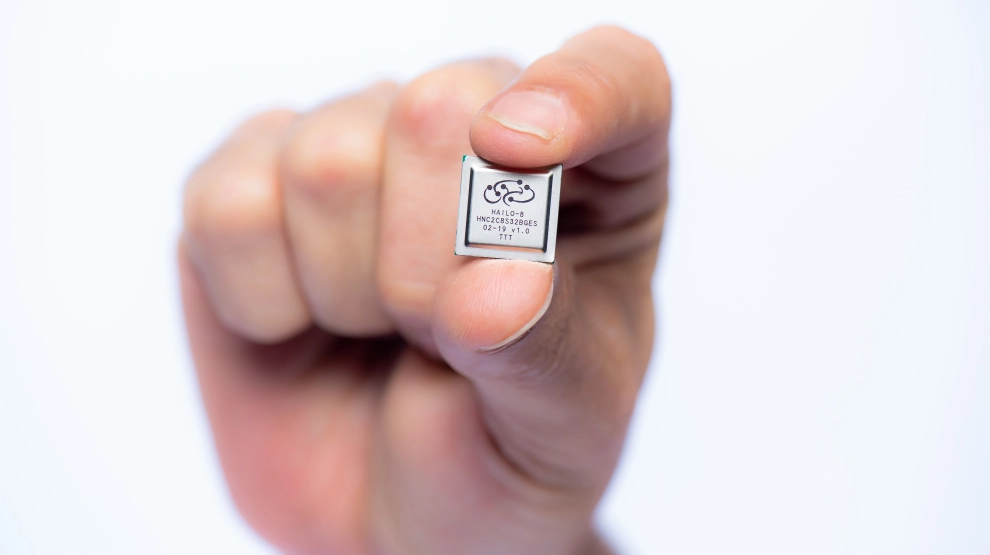 AI
AI
 AI
AI
 AI
AI
Artificial intelligence chip startup Hailo Technologies Ltd. today announced that it has closed a $136 million funding round to expand go-to-market operations and improve its technology.
The round was led by Poalim Equity and Gil Agmon. Tel Aviv-based Halio has raised a total of $224 million to date.
Hailo’s AI chip, Hailo-8, can be installed in autonomous vehicles, industrial robots and other edge systems to run AI models. The startup says Hailo-8 can significantly outperform a number of edge AI products from Nvidia Corp., the top maker of chips for machine learning applications. According to Hailo, its chip provides industry-leading speed while taking up less space than a penny inside an edge computing device’s chassis and using about 2.5 watts of power.
Hailo-8’s efficiency is the result of a chip architecture optimized specifically for machine learning. The architecture speeds up deep learning models by reducing the distance that data has to travel between different parts of the chip while processing is carried out.
Deep learning, the most powerful variety of AI, uses layers of artificial neurons to perform processing. An artificial neuron is a piece of code that performs a mathematical operation on the data an AI model ingests. A layer of artificial neurons performs the same task, only on a large scale.
A deep learning model has a large number of artificial neuron layers that work in tandem to turn raw data into insights. Each layer performs a small portion of the calculations required to produce a useful result, then passes its output to the next layer. The process is repeated many times until the AI generates a decision.
At the hardware level, artificial neuron layers run on different parts of the underlying processor. When one layer passes its output to the next, the data has to travel to another section of the processor. The amount of time it takes the data to cover the necessary distance directly influences AI performance: the faster information arrives at its destination, the faster the processor works.
On Hailo’s chip, data has to travel shorter distances than on traditional processors. As a result, information arrives at its destination sooner and can be processed faster.

Hailo reduces data travel by optimizing how the artificial neuron layers of an AI model are distributed across the Hailo-8 chip. If two AI layers exchange data with each other, for example because the first layer performs processing on the output of the second, they are placed on two immediately adjacent sections of the chip. Because the two layers are in close proximity to each other, data flowing between them has to travel only a short distance, which speeds up processing.
Hailo optimizes AI models to take advantage of its chip architecture with the help of a custom software compiler. The compiler automatically assigns each AI layer to the part of the chip where it can most efficiently exchange data with the adjacent artificial neuron layers. At the hardware level, each chip section containing a layer includes both compute units for processing data and memory units for storing it.
According to Hailo, placing compute and memory resources side by side is another feature that helps increase efficiency. Normally, memory is implemented separately from the chip. Information has to travel back and forth between the two components to be processed. Having everything in one place reduces data travel.
Hailo says its chip can perform up to 26 trillion operations per second. In systems that require more processing capacity, such as smart cars, multiple Hailo-8 chips may be deployed side by side.
Hailo is targeting the chip at use cases such as autonomous driving, factory automation and smart city operations. The startup says that more than 100 customers are already exploring ways to apply its chip, more than double the number of clients it had only two quarters ago.
“This tremendous support is a testament to our unparalleled edge AI product line, and we look forward to empowering even smarter and swifter devices, and thus, a more robust future powered by AI,” said Hailo co-founder and Chief Executive Officer Orr Danon.
Hailo plans to use the proceeds from its new $136 million funding round to invest in product development. Additionally, the startup intends to expand its presence in current market segments and move into additional markets.
Support our mission to keep content open and free by engaging with theCUBE community. Join theCUBE’s Alumni Trust Network, where technology leaders connect, share intelligence and create opportunities.
Founded by tech visionaries John Furrier and Dave Vellante, SiliconANGLE Media has built a dynamic ecosystem of industry-leading digital media brands that reach 15+ million elite tech professionals. Our new proprietary theCUBE AI Video Cloud is breaking ground in audience interaction, leveraging theCUBEai.com neural network to help technology companies make data-driven decisions and stay at the forefront of industry conversations.